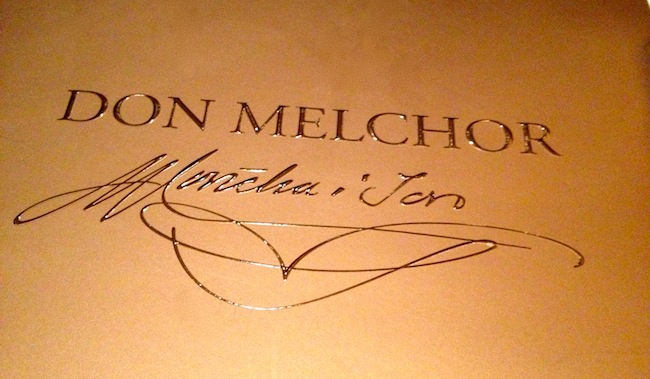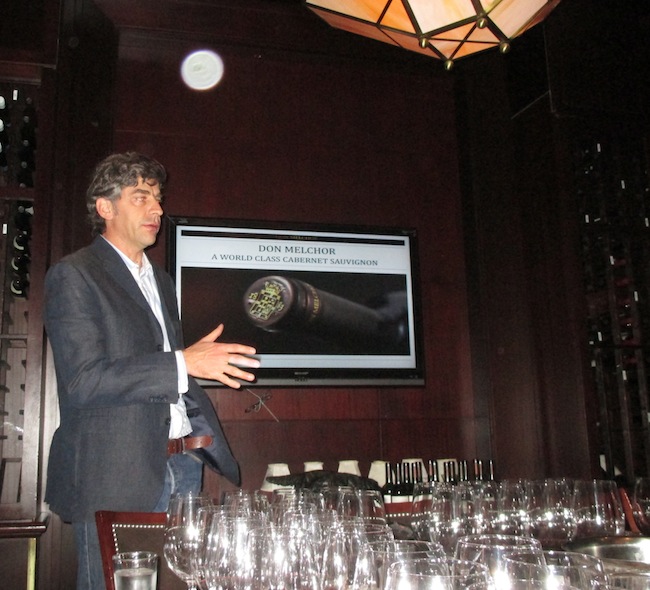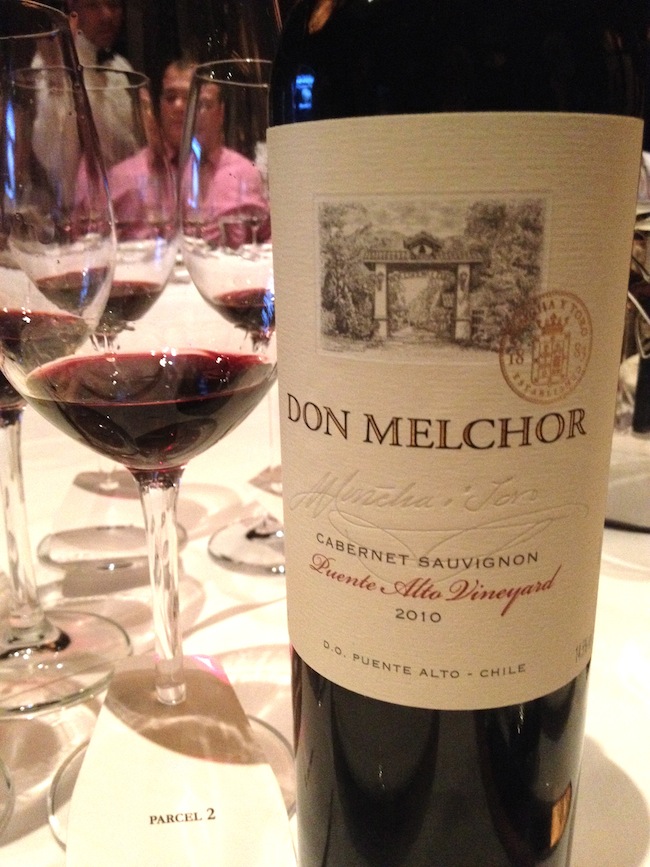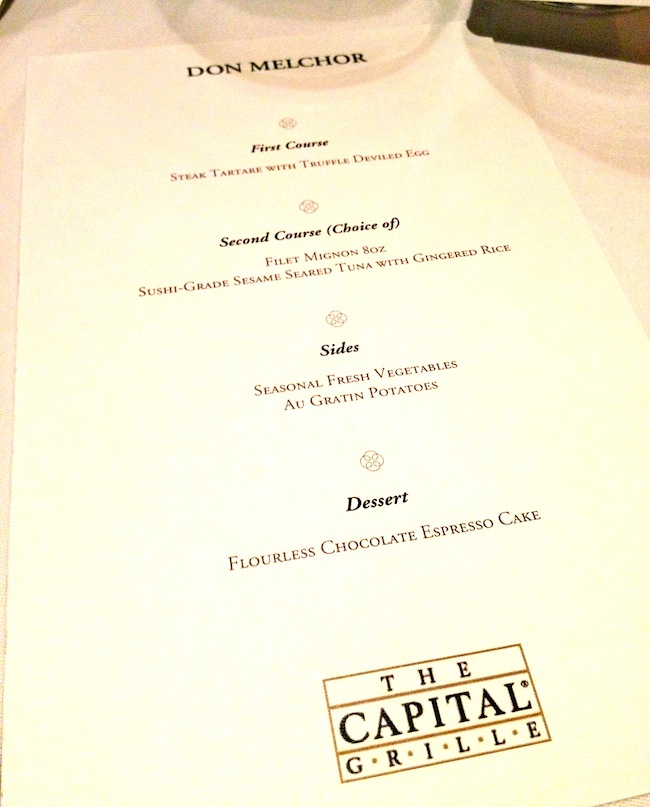The Cambridge Dictionary defines the word "icon" as: "relating to or characteristic of a famous person or thing that represents something of importance." While we're accustomed to hearing this word used to refer to a person, what exactly does "icon" mean when used to refer to a wine?Much like Joan Rivers was a true comedic icon, the term refers to something that is original, exceptional and enduring with a proven track record and standard of excellence to which others rightly aspire. In wine, excellence is dictated by many factors including vineyard location, soil type, grape variety, climate, viticultural practices, winemaking techniques, and how these factors come together to consistently produce an excellent product year after year even in the face of adverse conditions. Recently I had the distinct pleasure of meeting Enrique Tirado, Winemaker of one of Chile's true icon wines, Don Melchor Cabernet Sauvignon. In 1883 Don Melchor Concha y Toro planted the first noble vines he and his wife brought back from Bordeaux in the Maipo Valley at the foot of the Andes mountains. This planting laid the ground for what would later become Concha y Toro which, after decades of growth and expansion, became the world's first winery to have its shares traded on the New York Stock Exchange. Today it is a global brand whose distribution extends to 125 countries around the globe. In remembrance of its founder's entrepreneurial spirit, Concha y Toro created Don Melchor in 1987, a wine which paved the way for a new era in Chilean wine, proving the country could in fact produce some serious, world class wine.
In 1883 Don Melchor Concha y Toro planted the first noble vines he and his wife brought back from Bordeaux in the Maipo Valley at the foot of the Andes mountains. This planting laid the ground for what would later become Concha y Toro which, after decades of growth and expansion, became the world's first winery to have its shares traded on the New York Stock Exchange. Today it is a global brand whose distribution extends to 125 countries around the globe. In remembrance of its founder's entrepreneurial spirit, Concha y Toro created Don Melchor in 1987, a wine which paved the way for a new era in Chilean wine, proving the country could in fact produce some serious, world class wine. Enrique Tirado joined the Don Melchor team in 1997 and, after proving his winemaking acumen and demonstrating his tireless dedication to research of different terroirs, was appointed as the wine's sole winemaker in 1999. According to Tirado, "Don Melchor's style captures the complexity and finesse expressed through the perfect balance of the stony Puente Alto soil, the Andean breeze, the generous Maipo Valley climate and the thirty years vines have taken to produce their best grapes." His enduring passion for the Puente Alto terroir was evident during a recent trade tasting at Miami's Capital Grille. During the tasting we were able to sample all the Don Melchor vineyard parcels allocated to this storied wine. The vineyard is divided into seven parcels of which six are planted to Cabernet Sauvignon and one is planted to Cabernet Franc. Sampling each individual parcel and noting the distinct differences of each proved to be a wonderful lesson in the art of blending; Parcel 1 demonstrated expressive notes of black fruit and sweet tannins; Parcel 4 had wonderful acid and tannin structure accompanied by ripe red fruit; and Parcel 7, the sole Cabernet Franc parcel, was characterized by the variety's hallmark notes of black tea, earth and candied violet. It quickly became obvious how selecting the right proportion of each parcel could prove to be a daunting, yet rewarding task.
Enrique Tirado joined the Don Melchor team in 1997 and, after proving his winemaking acumen and demonstrating his tireless dedication to research of different terroirs, was appointed as the wine's sole winemaker in 1999. According to Tirado, "Don Melchor's style captures the complexity and finesse expressed through the perfect balance of the stony Puente Alto soil, the Andean breeze, the generous Maipo Valley climate and the thirty years vines have taken to produce their best grapes." His enduring passion for the Puente Alto terroir was evident during a recent trade tasting at Miami's Capital Grille. During the tasting we were able to sample all the Don Melchor vineyard parcels allocated to this storied wine. The vineyard is divided into seven parcels of which six are planted to Cabernet Sauvignon and one is planted to Cabernet Franc. Sampling each individual parcel and noting the distinct differences of each proved to be a wonderful lesson in the art of blending; Parcel 1 demonstrated expressive notes of black fruit and sweet tannins; Parcel 4 had wonderful acid and tannin structure accompanied by ripe red fruit; and Parcel 7, the sole Cabernet Franc parcel, was characterized by the variety's hallmark notes of black tea, earth and candied violet. It quickly became obvious how selecting the right proportion of each parcel could prove to be a daunting, yet rewarding task. After sampling the parcels, Tirado got to his specialty: blending! First, he created a blend which represented each parcels' percentage of the 127 hectare Don Melchor vineyard. For example if Parcel 1 was 22% of the entire vineyard, the wine from that parcel comprised 22% of the blend. Based on this approach, our group generally concurred Blend #1 was very expressive with plenty of ripe fruit character, however, lacked structure and acidity. To remedy this, Tirado asked us (yes, us!) which parcels we would add more or less of to improve the blend. With some guidance from him, we examined the parcels and decided to add more of Parcel 4, raising it from 17% to 30% of the blend, as well as decrease the amount of Parcel 5, taking it from 20% to 8%. This blend, creatively dubbed Blend #2, had more acidity and tannin however the wine was not balanced. We all agreed it would probably benefit from additional time in the bottle although it would not quite fix everything that was wrong with it. Tirado made a very valuable point that if a wine's tannins are out of balance when it is made, no amount of cellar age will fix it. As a group effort, I think we actually did pretty darn good and as it opened up in the glass, most of us actually preferred Blend #2 to Blend #1.After our blending tutorial, we were rewarded with a glass of 2010 Don Melchor, a blend of 97% Cabernet Sauvignon and 3% Cabernet Franc (we were not privy to the parcel percentage breakdown) aged for 15 months in French oak barrels (76% new, 24% second use). The 2010 vintage was characterized by lower than normal temperatures which delayed the onset of harvest so the grapes could adequately ripen. The result is a full-bodied wine with an intense, ruby red color and expressive aromas of red and black fruit, graphite and earth. On the palate, mouth-filling flavors of pomegranate, plum, cocoa and hoisin are seamlessly integrated and accompanied by elegant tannins and a fresh acidity making this wine perfectly enjoyable now, yet it will definitely benefit from years in the cellar. Critical acclaim and accolades for this icon wine are indeed plentiful with six vintages of the Don Melchor Cabernet Sauvignon ranking among Wine Spectator's Top 100 Wines of the Year; the publication also awarded the 2010 vintage 95 points.
After sampling the parcels, Tirado got to his specialty: blending! First, he created a blend which represented each parcels' percentage of the 127 hectare Don Melchor vineyard. For example if Parcel 1 was 22% of the entire vineyard, the wine from that parcel comprised 22% of the blend. Based on this approach, our group generally concurred Blend #1 was very expressive with plenty of ripe fruit character, however, lacked structure and acidity. To remedy this, Tirado asked us (yes, us!) which parcels we would add more or less of to improve the blend. With some guidance from him, we examined the parcels and decided to add more of Parcel 4, raising it from 17% to 30% of the blend, as well as decrease the amount of Parcel 5, taking it from 20% to 8%. This blend, creatively dubbed Blend #2, had more acidity and tannin however the wine was not balanced. We all agreed it would probably benefit from additional time in the bottle although it would not quite fix everything that was wrong with it. Tirado made a very valuable point that if a wine's tannins are out of balance when it is made, no amount of cellar age will fix it. As a group effort, I think we actually did pretty darn good and as it opened up in the glass, most of us actually preferred Blend #2 to Blend #1.After our blending tutorial, we were rewarded with a glass of 2010 Don Melchor, a blend of 97% Cabernet Sauvignon and 3% Cabernet Franc (we were not privy to the parcel percentage breakdown) aged for 15 months in French oak barrels (76% new, 24% second use). The 2010 vintage was characterized by lower than normal temperatures which delayed the onset of harvest so the grapes could adequately ripen. The result is a full-bodied wine with an intense, ruby red color and expressive aromas of red and black fruit, graphite and earth. On the palate, mouth-filling flavors of pomegranate, plum, cocoa and hoisin are seamlessly integrated and accompanied by elegant tannins and a fresh acidity making this wine perfectly enjoyable now, yet it will definitely benefit from years in the cellar. Critical acclaim and accolades for this icon wine are indeed plentiful with six vintages of the Don Melchor Cabernet Sauvignon ranking among Wine Spectator's Top 100 Wines of the Year; the publication also awarded the 2010 vintage 95 points. We enjoyed our assortment of wines with a delicious lunch consisting of a flavorful Steak Tartare with Truffle Deviled Egg followed by a melt in your mouth Filet Mignon (perfectly cooked medium-rare) accompanied by au gratin potatoes and roasted green beans and garlic. Needless to say the Don Melchor Cabernet Sauvignon made a perfect pairing for the filet and was a delightful conclusion to a very informative and enjoyable tasting.For information on purchasing the 2010 Concha y Toro Don Melchor Cabernet Sauvignon ($99) please click here to visit the Wine Atelier.Cheers,
We enjoyed our assortment of wines with a delicious lunch consisting of a flavorful Steak Tartare with Truffle Deviled Egg followed by a melt in your mouth Filet Mignon (perfectly cooked medium-rare) accompanied by au gratin potatoes and roasted green beans and garlic. Needless to say the Don Melchor Cabernet Sauvignon made a perfect pairing for the filet and was a delightful conclusion to a very informative and enjoyable tasting.For information on purchasing the 2010 Concha y Toro Don Melchor Cabernet Sauvignon ($99) please click here to visit the Wine Atelier.Cheers,
Stephanie Miskew
Author